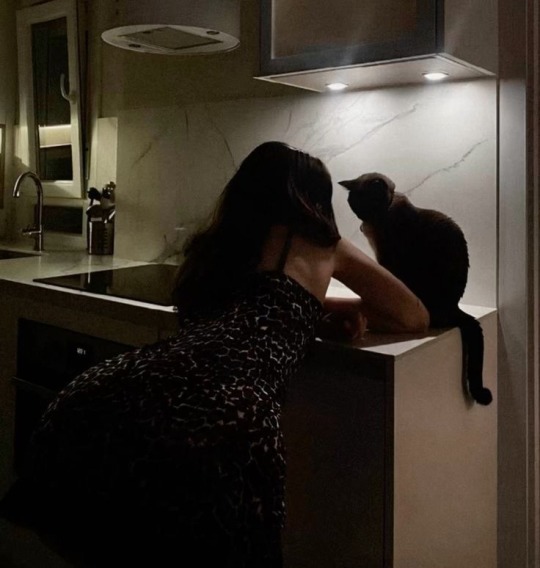#or this persons' lifestyle
Explore tagged Tumblr posts
Text
I've reached season 5 on my CSI rewatch and I'm a few episodes past "Swap Meet", where a woman is murdered after attending a swing party with other couples from the neighbourhood. Near the end of the episode there's a moment that made me jump from my seat:
(Grissom walks up to Sara and takes the seat next to her. He's holding two cups. He hands her a cup of tea.)
[INT. POLICE DEPARTMENT - BRASS' OFFICE]
Erin Brady: Everybody fantasizes about other people. (She glances at Grissom.)
Even you, Mr. Grissom. A neighbor, a friend ... girl at the office.
[INT. POLICE DEPARTMENT - HALLWAY]
(The door opens. Paul Brady walks out of the hallway. Erin Brady walks out into the hallway. Sara is sitting in the hallway chair watching them. She watches as they meet and kiss.)
(Grissom walks up to Sara and takes the seat next to her. He's holding two culps. He hands her a cup of tea.)
LIKE!!!!!!!
Right after Erin ends her sentence with 'girl at the office', the first time Sara and Grissom meet again, he brings her tea. This might be an innocent interaction but to me it seemed like a nod to this relationship they have where both are into each other, know about the other's feelings, but can't/won't do anything about it (although Sara has kind of given Grissom an ultimatum). I don't know if it was intentional - I'm guessing it is, because I picked it up immediately. I might or might not have squealed in delight.
#csi#gsr#i'm very Normal about them btw i don't think about them 50 times per day or anything#need to talk more about these two here#because im obsessed about them in a Normal way#sara is like. my dream wife. i totally get grissom being in love with her for years and barely holding it together#i would not though#i'm 1000% sure she's bi. but the writers have been cowards so far#also she and i dress THE SAME. yes i love 2000s clothes so what#i could talk about her forever she's everything to me#and grissom. oh grissom. i also get why she's been in love with him forever#i mean what the FUCK went down in san francisco did they hook up and sex was so good it scared them#and now they have to live with that tension and they're scared of crossing that line#nah i'm guessing with these two they just REALLY clicked. like. they were an instant match and they knew it#but grissom didnt want to lose focus on work or whatever and they lived in separate states you know#but oh my god i totally get sara. grissom is such a silver fox. he's like one of the hottest old men i've ever seen in my life#you know what i 100% get tumblr sexualizing old men it's completely valid i'm in this now too#he has this LOOK. whenever he's angry at a suspect. and he looks angrily at them. i'm chewing on my keyboard just remembering it#and his smirks#AND THE WAY HE LOOKS AT SARA#im losing my mind#i love all of gil grissom but seasons 4-5 jesus fucking christ#ok enough with the sexualizing i love him as a character SO MUCH. he's absolutely fantastic#one of the things i love the most about him is that he doesn't judge people. whenever the team is confused about someone#or this persons' lifestyle#he's always trying to understand them and not judge them#like a true scientist he wants to understand the nature of things and people#and he's such a sweetheart i love him so much#like there are so many things i love about him i can't fit them all in the tags. same for sara#they're a perfect match for me
23 notes
·
View notes
Text
looking at next month's schedule and between the end of 7-12 and the wishing lantern event it's like

February is officially RIDDLE MONTH, brace yourselves to be absolutely blasted into ashes everybody

#art#twisted wonderland#twisted wonderland spoilers#twisted wonderland episode 7 spoilers#twisted wonderland book 7 spoilers#twisted wonderland episode 7 part 12 spoilers#twisted wonderland book 7 part 12 spoilers#negai no lantern#gif warning#gifs that have memorized all 800+ rules and expect no less from you warning#sorry cater and azul i hope you have very happy birthdays but i'm going to actually explode#just laying on the floor and thinking about rapunzel-themed event feat. riddle#and ESPECIALLY right after we get his big dream sequence wherein he fistfights his deep-seated personal issues#and i'm STILL processing trey's dream and what it says about his friendship with riddle especially like#i'm#i just#okay hold on i gotta distract myself by looking at the other lantern boys#and their beautiful long flowing tresses that defy physics to blow dramatically behind them#whoever keeps putting jack in the shimmery sparkly delicate floaty chiffon events is my personal hero#his card is incredible. he looks like a perfume ad.#he wants us to know that you can live a rugged outdoorsy lifestyle and still have an undertone of delicate floral notes#god. everyone looks amazing this event is going to be amazing#and like...it probably isn't going to go too deep because silly event versus main story and all#but just the act of casting riddle as the center is still just so#like#i gotta go lay on the floor some more
7K notes
·
View notes
Text
i fucking hate emotions

#yuyu's thoughts#actually bpd#bpd#jirai kei#bpd irl#jirai#jirai girl#jirai onna#landmine girl#landmine type#Lifestyle Landmine#jiraiblr#jiraiblogging#jirai lifestyle#landmineposting#menhera#menhera girl#irl bpd#bpd vent#actually borderline#borderline personality disorder#jirai joshi#landmine blogging#landmine#landmineblogging#landmineblr
4K notes
·
View notes
Text
Become Your Best Version Before 2025 Masterlist

Hello! This is the Become Your Best Version Before 2025 masterlist. It’s a collection of all the posts from the series, gathered in one place to make it easier for you to access and follow along.
I hope you find it inspiring and helpful as you work towards becoming the best version of yourself!

Day 1: What Does Becoming Your Best Version Mean
Day 2: Understanding Yourself / Self-assessment
Day 3: Identifying Limiting Beliefs
Day 4: Identifying Your Core Values
Day 5: Setting SMART Goals That Actually Stick
Day 6: Creating Your Personal Mission Statement
Day 7: Building Better Habits
Day 8: Mastering Time Management
Day 9: Auditing Your Relationships
Day 10: Mastering Your Emotions
Day 11: Taking Care of Your Body
Day 12: Stress Management
Day 13: Financial Planning and Budgeting
Day 14: Career and Purpose
Day 15: The Power of Self-Talk
Day 16: Digital Detox and Mindful Living
Day 17: Decluttering Your Life
Day 18: Creating Healthy Boundaries
Day 19: Self-Care Rituals That Actually Stick
Day 20: Building Confidence
Day 21: Overcoming Fear & Self-Doubt
Day 22: Developing New Skills
Day 23: Personal Style & Self-Presentation
Day 24: Setting Up Progress Tracking Systems
Day 25: Designing Your Accountability Plan
Day 26: Personal Development Tools and Resources
Day 27: Hobbies & Passion Projects
Day 28: How to Keep Yourself Motivated
Day 29: Prioritizing Yourself and Your Needs
Day 30: Creating Your Vision for 2025
Day 31: The Beginning of Your Best Year Yet
*** Divider Credit: @thecutestgrotto ***
#self love#become that girl#becoming the best version of yourself#become your best version#be confident#be your best self#be your true self#becoming that girl#confidence#growth mindset#it girl#self confidence#self improvement#personal development#self development#self care#self esteem#self worth#self concept#glow up tips#that girl tips#that girl#dream life#lifestyle#girl blog aesthetic#girl blogger#goddessinnerglowblog#goddessinnerglowmagazine#self appreciation#self acceptance
2K notes
·
View notes
Text
2025 Vision 🖤🍸🪩




#luxuries#luxury living#luxury#level up#leveled up woman#leveling up journey#leveling up tips#level up journey#level up tips#dream girl aesthetic#feminine aesthetic#feminine inspiration#hyper feminine#hypergamous dating#hypergamous lifestyle#hyperfemmine#hypergamous#hyperfeminine#hyperfemininity#hypergamy#self development#that girl#leveling up#personal development#that girl aesthetic#2025 goals#old money aesthetic#high standards#hvg#high value heaux
3K notes
·
View notes
Text
𝐻𝑂𝑊 𝑇𝑂 𝐺𝐿𝑂𝑊 𝑈𝑃- 1𝑆𝑇 𝑄𝑈𝐴𝑅𝑇𝐸𝑅

𝐹𝑂𝑅 𝐴 𝑆��𝐶𝐶𝐸𝑆𝑆𝐹𝑈𝐿 𝐺𝐿𝑂𝑊 𝑈𝑃 𝐼𝑁 2025
𝐼𝑓 𝑦𝑜𝑢'𝑟𝑒 𝑠𝑒𝑟𝑖𝑜𝑢𝑠 𝑎𝑏𝑜𝑢𝑡 𝑚𝑎𝑘𝑖𝑛𝑔 2025 𝑦𝑜𝑢𝑟 𝑦𝑒𝑎𝑟, 𝑠𝑡𝑎𝑟𝑡 𝑏𝑦 𝑓𝑜𝑐𝑢𝑠𝑖𝑛𝑔 𝑜𝑛 𝑘𝑒𝑦 𝑎𝑟𝑒𝑎𝑠 𝑜𝑓 𝑦𝑜𝑢𝑟 𝑙𝑖𝑓𝑒 : 𝐾𝑛𝑜𝑤𝑙𝑒𝑑𝑔𝑒, 𝐻𝑒𝑎𝑙𝑡ℎ, 𝐶𝑎𝑟𝑒𝑒𝑟, 𝑅𝑒𝑙𝑎𝑡𝑖𝑜𝑛𝑠ℎ𝑖𝑝𝑠, 𝐸𝑛𝑣𝑖𝑟𝑜𝑛𝑚𝑒𝑛𝑡, 𝑃𝑒𝑟𝑠𝑜𝑛𝑎𝑙 𝐷𝑒𝑣𝑒𝑙𝑜𝑝𝑚𝑒𝑛𝑡, 𝑎𝑛𝑑 𝑇𝑖𝑚𝑒 𝑀𝑎𝑛𝑎𝑔𝑒𝑚𝑒𝑛𝑡.
𝑇ℎ𝑒 𝑦𝑒𝑎𝑟 𝑖𝑠 𝑑𝑖𝑣𝑖𝑑𝑒𝑑 𝑖𝑛𝑡𝑜 4 𝑞𝑢𝑎𝑟𝑡𝑒𝑟𝑠, 𝑎𝑛𝑑 𝑓𝑜𝑟 𝑒𝑎𝑐ℎ 𝑞𝑢𝑎𝑟𝑡𝑒𝑟 𝑖𝑠 𝑎𝑛 𝑜𝑝𝑝𝑜𝑟𝑡𝑢𝑛𝑖𝑡𝑦 𝑡𝑜 𝑙𝑒𝑣𝑒𝑙 𝑢𝑝. 𝐹𝑜𝑐𝑢𝑠 𝑜𝑛 2 𝑎𝑟𝑒𝑎𝑠 𝑡ℎ𝑖𝑠 𝑞𝑢𝑎𝑟𝑡𝑒𝑟 𝑎𝑛𝑑 𝑏𝑢𝑖𝑙𝑑 ℎ𝑎𝑏𝑖𝑡𝑠 𝑡ℎ𝑎𝑡 𝑤𝑖𝑙𝑙 𝑠𝑡𝑖𝑐𝑘.
𝑇𝐼𝑃: 21 𝑑𝑎𝑦𝑠 𝑡𝑜 𝑏𝑢𝑖𝑙𝑑 𝑎 ℎ𝑎𝑏𝑖𝑡. 90 𝑑𝑎𝑦𝑠 𝑡𝑜 𝑚𝑎𝑘𝑒 𝑖𝑡 𝑎 𝑙𝑖𝑓𝑒𝑠𝑡𝑦𝑙𝑒.
𝐽𝐴𝑁-𝐹𝐸𝐵-𝑀𝐴𝑅
𝐶ℎ𝑜𝑜𝑠𝑒 𝑌𝑜𝑢𝑟 𝐹𝑜𝑐𝑢𝑠 : 𝐸𝑥𝑎𝑚𝑝𝑙𝑒 𝑎𝑟𝑒𝑎𝑠 :
✰ 𝐾𝑛𝑜𝑤𝑙𝑒𝑑𝑔𝑒 (𝑙𝑒𝑎𝑟𝑛 𝑛𝑒𝑤 𝑠𝑘𝑖𝑙𝑙𝑠, 𝑠𝑡𝑎𝑦 𝑖𝑛𝑓𝑜𝑟𝑚𝑒𝑑).
✰ 𝐻𝑒𝑎𝑙𝑡ℎ (𝐸𝑥𝑒𝑟𝑐𝑖𝑠𝑒, 𝑒𝑎𝑡 𝑏𝑒𝑡𝑡𝑒𝑟).
𝑆𝑒𝑡 3 𝐶𝑙𝑒𝑎𝑟 𝐺𝑜𝑎𝑙𝑠 𝑓𝑜𝑟 𝐸𝑎𝑐ℎ 𝐴𝑟𝑒𝑎:
𝑒.𝑔. 𝐻𝐸𝐴𝐿𝑇𝐻 :
✰ 𝐷𝑟𝑖𝑛𝑘 2𝐿 𝑜𝑓 𝑤𝑎𝑡𝑒𝑟 𝑑𝑎𝑖𝑙𝑦.
✰ 𝑇𝑟𝑦 𝑦𝑜𝑔𝑎 𝑡𝑤𝑖𝑐𝑒 𝑎 𝑤𝑒𝑒𝑘.
✰ 𝐵𝑢𝑖𝑙𝑑 𝑎 𝑐𝑜𝑛𝑠𝑖𝑠𝑡𝑒𝑛𝑡 𝑚𝑜𝑟𝑛𝑖𝑛𝑔 𝑠𝑘𝑖𝑛𝑐𝑎𝑟𝑒 𝑟𝑜𝑢𝑡𝑖𝑛𝑒

𝐾𝑁𝑂𝑊𝐿𝐸𝐷𝐺𝐸 𝐼𝐷𝐸𝐴𝑆
✰ 𝑅𝑒𝑎𝑑 1 𝑜𝑟 2 𝑏𝑜𝑜𝑘𝑠 𝑝𝑒𝑟 𝑚𝑜𝑛𝑡ℎ.
✰ 𝐿𝑒𝑎𝑟𝑛 𝑛𝑒𝑤 𝑠𝑘𝑖𝑙𝑙 𝑙𝑖𝑘𝑒 𝑎 𝑙𝑎𝑛𝑔𝑢𝑎𝑔𝑒 𝑜𝑟 𝑏𝑢𝑑𝑔𝑒𝑡𝑖𝑛𝑔.
✰ 𝐿𝑖𝑠𝑡𝑒𝑛 𝑡𝑜 𝑝𝑜𝑑𝑐𝑎𝑠𝑡𝑠 𝑜𝑟 𝑇𝐸𝐷 𝑇𝑎𝑙𝑘𝑠.
✰ 𝐽𝑜𝑢𝑟𝑛𝑎𝑙 3 𝑡𝑖𝑚𝑒𝑠 𝑎 𝑤𝑒𝑒𝑘 𝑓𝑜𝑟 𝑠𝑒𝑙𝑓-𝑟𝑒𝑓𝑙𝑒𝑐𝑡𝑖𝑜𝑛.
✰ 𝑇𝑎𝑘𝑒 𝑎���� 𝑜𝑛𝑙𝑖𝑛𝑒 𝑐𝑜𝑢𝑟𝑠𝑒 (𝐶𝑜𝑢𝑟𝑠𝑒𝑟𝑎, 𝑌𝑜𝑢𝑡𝑢𝑏𝑒 𝑡𝑢𝑡𝑜𝑟𝑖𝑎𝑙𝑠).
✰ 𝑆𝑡𝑎𝑦 𝑢𝑝𝑑𝑎𝑡𝑒𝑑 𝑜𝑛 𝑐𝑢𝑟𝑟𝑒𝑛𝑡 𝑒𝑣𝑒𝑛𝑡𝑠.
𝐻𝐸𝐴𝐿𝑇𝐻 𝐼𝐷𝐸𝐴𝑆
✰ 𝐸𝑥𝑒𝑟𝑐𝑖𝑠𝑒 3-4 𝑡𝑖𝑚𝑒𝑠 𝑎 𝑤𝑒𝑒𝑘 (𝑦𝑜𝑔𝑎, 𝑤𝑎𝑙𝑘𝑖𝑛𝑔, 𝐻𝐼𝐼𝑇).
✰ 𝐸𝑎𝑡 𝑏𝑎𝑙𝑎𝑛𝑐𝑒𝑑 𝑚𝑒𝑎𝑙𝑠- 𝑓𝑜𝑐𝑢𝑠 𝑜𝑛 𝑝𝑟𝑜𝑡𝑒𝑖𝑛 𝑎𝑛𝑑 𝑔𝑟𝑒𝑒𝑛𝑠.
✰ 𝐻𝑦𝑑𝑟𝑎𝑡𝑒 : 𝑎𝑖𝑚 𝑓𝑜𝑟 8 𝑔𝑙𝑎𝑠𝑠𝑒𝑠 𝑜𝑓 𝑤𝑎𝑡𝑒𝑟 𝑑𝑎𝑖𝑙𝑦.
✰ 𝐺𝑒𝑡 7-8 ℎ𝑜𝑢𝑟𝑠 𝑜𝑓 𝑢𝑛𝑖𝑛𝑡𝑒𝑟𝑟𝑢𝑝𝑡𝑒𝑑 𝑠𝑙𝑒𝑒𝑝.
✰ 𝑆𝑡𝑎𝑟𝑡 𝑚𝑒𝑑𝑖𝑡𝑎𝑡𝑖𝑜𝑛 𝑜𝑟 𝑏𝑟𝑒𝑎𝑡ℎ𝑖𝑛𝑔 𝑒𝑥𝑒𝑟𝑐𝑖𝑠𝑒𝑠.
✰ 𝑇𝑟𝑦 𝑎 𝑠𝑜𝑐𝑖𝑎𝑙 𝑚𝑒𝑑𝑖𝑎 𝑑𝑒𝑡𝑜𝑥 𝑜𝑛𝑒 𝑑𝑎𝑦 𝑎 𝑤𝑒𝑒𝑘.
𝐻𝑂𝑊 𝑇𝑂 𝐵𝑈𝐼𝐿𝐷 𝑌𝑂𝑈𝑅 𝐺𝐿𝑂𝑊-𝑈𝑃 𝑃𝐿𝐴𝑁
1. 𝑈𝑆𝐸 𝑇𝐻𝐸 21/90 𝑅𝑈𝐿𝐸 :
𝑃𝑟𝑎𝑐𝑡𝑖𝑐𝑒 𝑎𝑛𝑦 ℎ𝑎𝑏𝑖𝑡 𝑓𝑜𝑟 21 𝑑𝑎𝑦𝑠.
𝑀𝑎𝑖𝑛𝑡𝑎𝑖𝑛 𝑖𝑡 𝑓𝑜𝑟 90 𝑑𝑎𝑦𝑠 𝑡𝑜 𝑡𝑢𝑟𝑛 𝑖𝑡 𝑖𝑛𝑡𝑜 𝑎 𝑙𝑖𝑓𝑒𝑠𝑡𝑦𝑙𝑒.
2. 𝑇𝑅𝐴𝐶𝐾 𝑌𝑂𝑈𝑅 𝑃𝑅𝑂𝐺𝑅𝐸𝑆𝑆 :
𝑈𝑠𝑒 𝑎 ℎ𝑎𝑏𝑖𝑡 𝑡𝑟𝑎𝑐𝑘𝑒𝑟 𝑜𝑟 𝑗𝑜𝑢𝑟𝑛𝑎𝑙 𝑡𝑜 𝑠𝑡𝑎𝑦 𝑎𝑐𝑐𝑜𝑢𝑛𝑡𝑎𝑏𝑙𝑒.
3. 𝑅𝐸𝑊𝐴𝑅𝐷 𝑌𝑂𝑈𝑅𝑆𝐸𝐿𝐹 :
𝑆𝑚𝑎𝑙𝑙 𝑟𝑒𝑤𝑎𝑟𝑑𝑠 𝑎𝑓𝑡𝑒𝑟 21 𝑑𝑎𝑦𝑠 :
𝐵𝑢𝑦 𝑎 𝑏𝑜𝑜𝑘 𝑦𝑜𝑢'𝑣𝑒 𝑤𝑎𝑛𝑡𝑒𝑑.
𝑇𝑟𝑒𝑎𝑡 𝑦𝑜𝑢𝑟𝑠𝑒𝑙𝑓 𝑡𝑜 𝑎 𝑠𝑘𝑖𝑛𝑐𝑎𝑟𝑒 𝑝𝑟𝑜𝑑𝑢𝑐𝑡.
𝑇𝑎𝑘𝑒 𝑎 𝑠𝑒𝑙𝑓-𝑐𝑎𝑟𝑒 𝑑𝑎𝑦.
𝑆𝑇𝑈𝐷𝑌 𝑇𝐼𝑃𝑆 𝐹𝑂𝑅 𝑇𝐻𝐼𝑆 𝑄𝑈𝐴𝑅𝑇𝐸𝑅
1. 𝑆𝑇𝐴𝑌 𝑂𝑅𝐺𝐴𝑁𝐼𝑍𝐸𝐷 :
𝑈𝑠𝑒 𝑝𝑙𝑎𝑛𝑛𝑒𝑟𝑠 𝑜𝑟 𝑎𝑝𝑝𝑠 𝑙𝑖𝑘𝑒 𝑁𝑜𝑡𝑖𝑜𝑛.
𝐵𝑟𝑒𝑎𝑘 𝑠𝑡𝑢𝑑𝑦 𝑚𝑎𝑡𝑒𝑟𝑖𝑎𝑙 𝑖𝑛𝑡𝑜 𝑚𝑎𝑛𝑎𝑔𝑒𝑎𝑏𝑙𝑒 𝑐ℎ𝑢𝑛𝑘𝑠.
2. 𝑀𝐴𝑋𝐼𝑀𝐼𝑍𝐸 𝐹𝑂𝐶𝑈𝑆 :
𝑆𝑡𝑢𝑑𝑦 𝑖𝑛 25- 𝑚𝑖𝑛𝑢𝑡𝑒 𝑠𝑒𝑠𝑠𝑖𝑜𝑛𝑠 𝑤𝑖𝑡ℎ 5-𝑚𝑖𝑛𝑢𝑡𝑒 𝑏𝑟𝑒𝑎𝑘𝑠 (𝑃𝑜𝑚𝑜𝑑𝑜𝑟𝑜 𝑇𝑒𝑐ℎ𝑛𝑖𝑞𝑢𝑒).
𝐸𝑙𝑖𝑚𝑖𝑛𝑎𝑡𝑒 𝑑𝑖𝑠𝑡𝑟𝑎𝑐𝑡𝑖𝑜𝑛𝑠: 𝑡𝑢𝑟𝑛 𝑜𝑓𝑓 𝑛𝑜𝑡𝑖𝑓𝑖𝑐𝑎𝑡𝑖𝑜𝑛𝑠, 𝑐𝑙𝑒𝑎𝑟 𝑦𝑜𝑢𝑟 𝑑𝑒𝑠𝑘.
3. 𝑈𝑆𝐸 𝐴𝐶𝑇𝐼𝑉𝐸 𝑅𝐸𝐶𝐴𝐿𝐿 :
𝑄𝑢𝑖𝑧 𝑦𝑜𝑢𝑟𝑠𝑒𝑙𝑓 𝑖𝑛𝑠𝑡𝑒𝑎𝑑 𝑜𝑓 𝑟𝑒𝑟𝑒𝑎𝑑𝑖𝑛𝑔 𝑛𝑜𝑡𝑒𝑠.
𝐶𝑟𝑒𝑎𝑡𝑒 𝑓𝑙𝑎𝑠ℎ𝑐𝑎𝑟𝑑𝑠 𝑓𝑜𝑟 𝑞𝑢𝑖𝑐𝑘 𝑟𝑒𝑣𝑖𝑒𝑤𝑠.
4. 𝐶𝑅𝐸𝐴𝑇𝐸 𝐴 𝑆𝑇𝑈𝐷𝑌 𝑅𝑂𝑈𝑇𝐼𝑁𝐸 :
𝑃𝑖𝑐𝑘 𝑦𝑜𝑢𝑟 𝑚𝑜𝑠𝑡 𝑝𝑟𝑜𝑑𝑢𝑐𝑡𝑖𝑣𝑒 𝑡𝑖𝑚𝑒 𝑜𝑓 𝑑𝑎𝑦 (𝑚𝑜𝑟𝑛𝑖𝑛𝑔 𝑜𝑟 𝑛𝑖𝑔ℎ𝑡).
𝐾𝑒𝑒𝑝 𝑠𝑡𝑢𝑑𝑦 𝑠𝑒𝑠𝑠𝑖𝑜𝑛𝑠 𝑐𝑜𝑛𝑠𝑖𝑠𝑡𝑒𝑛𝑡.
5. 𝑀𝐴𝐾𝐸 𝐼𝑇 𝐹𝑈𝑁 :
𝑈𝑠𝑒 𝑐𝑜𝑙𝑜𝑟𝑓𝑢𝑙 𝑝𝑒𝑛𝑠 𝑜𝑟 𝑠𝑡𝑖𝑐𝑘𝑦 𝑛𝑜𝑡𝑒𝑠.
𝑃𝑙𝑎𝑦 𝑠𝑜𝑓𝑡 𝑚𝑢𝑠𝑖𝑐 𝑖𝑛 𝑡ℎ𝑒 𝑏𝑎𝑐𝑘𝑔𝑟𝑜𝑢𝑛𝑑.
#girlblogging#girl blogger#that girl#it girl#tips#mindset#self development#personal growth#self improvement#glow up#self care#2025#health and lifestyle#quarters#confidence
1K notes
·
View notes
Text


rebellion isn’t what you think it is


#self improvement#wonyoungism#health and wellness#healthy women#healthy lifestyle#positivity#that girl#becoming that girl#self care#self love#positive thoughts#pink pilates princess#green juice girl#glow up#level up#it girl#dream girl#girlblog#girlblogger#glow growth girlboss#personal growth#self development
1K notes
·
View notes
Text

#This is my personal experience#jiraiblr#landmineblr#jirai girl#jirai kei#jiraiblogging#landmine kei#jirai onna#lifestyle jirai#landmine girl#landmineblogging#🪷 diary
2K notes
·
View notes
Text

How to tackle chores when regressed :

Ello!! I’m here bc sometimes I find it sooo hard to check off my to-dos bc my liddol(s) out ૮꒰ྀི⊃⸝ ⸝ ⸝⊂꒱ྀིა
Here are some ideas for folks tht may be struggling getting up &&doing the tingz !!
♡ Print off a sticker chart !! Ik for me having external motivation aka cute lil stickers showing how good I’ve been can rly rly help !!
♡ Bring along your stuffie/favorite toy !! They’re your fren & wanna help u do the thing !!
♡ Play age-appropriate music & dance & sing along while u work !! This can make the thing feel less daunting & more silly & fun !!
♡ Have a kid-appropriate movie/tv show on in the background !! Just be sure to not get too distracted, little one !! ଘ(੭˃ᴗ˂)੭
♡ Ask your cg for a reward if u complete all da tingz !! Rewards can be things like regression time w them that night, sweets, etc !! If u don’t have a cg, thts totally ok !! U can also do these things solo !! ദ്ദി ( ᵔ ᗜ ᵔ )
♡ Make urself a snack/meal first !! Ik for me sometimes the energy boost is definitely needed !! Some age-appropriate foods can be apple slices w peanut butter/caramel, mac n cheese, milk in a baba, etc !! Just stay healthy little ones !!
♡ This one’s may be harder for some, but try calling another liddol fren/someone who supports your regression if you’ve got any !! I’m lucky enough to have this option, it’s ok if u don’t !! But sometimes talking to somebody helps me get up & at’em !!
♡ Play a regression podcast !! This one’s good for those of us tht may not have a cg/regression buddies to talk to !! When I’ve been cg-less these have rly rly helped me !! ૮ ˶ᵔ ᵕ ᵔ˶ ა

Feel free to add more, & have fun bein a good little kiddo !!
~ Starry ⋆⭒˚.⋆

#personal#did agere#18+ agere#age regression#age regressor#agere autism#agere blog#agere community#agere plushie#agere snacks#agere toys#agere sfw#agere little#agere food#sfw agere#safe agere#agere cg#agere coping#trans agere#agere caregiver#age re safe space#age re blog#age regressive#age re caregiver#agere lifestyle#agere learning#agere concept#agere activities#agere advice#agere help
1K notes
·
View notes
Text






#clean girl#it girl#that girl#how to be that girl#clean girl lifestyle#lifestyle#clean girl aesthetic#clean moodboard#healthylifestyle#health and wellness#pilates girl#girlblogging#glow up tips#be a better person
529 notes
·
View notes
Text
I have it good My parents actually care. I have friends, even if it's not as many as other people. I get what I want. I have a boyfriend who cares. Sure, I had trauma, but.. it's just not as bad as the ones I've heard. Mine's not even that bad. So why am I so sad? Why do I feel this way? Maybe I'm just an ungrateful child. Maybe I'm a spoiled brat. What's wrong with me ?
#zxloftt's vents☆#vent#jiraiblogging#landmine type#landmineblr#jiraikei#landmine kei#landmine girl#landmineblogging#jirai lifestyle#sh#personal vent#vent art#vent post#bpd vent#venting#vent blog#tw vent#$h tumblr#self mutalition#cvtblr#self h@rm#cvtt!ng#shitpost
665 notes
·
View notes
Text
it’s wild to me that like every modern adaptation of Sherlock Holmes (and by modern I mean “made recently” not “set in modern times”) is like Hell Bent on coming up with a Reason™️ that Watson stays with Holmes and trots around with him on adventures all the time despite the inconvenience and the danger and all, and so it’s like “oh, Watson’s a gambling addict, he loves uncertainty and mystery” or “oh, Watson’s an adrenaline junkie, he gets off on being constantly in danger from criminals” or even like “Watson’s atoning for sins of the past of BEING IN THE WAR by solving crimes with Holmes now” or WHATEVER. And it’s like, girl, maybe he’s just in love! Did you think of that?? Maybe he’s got a crush and it’s making him do stupid things. Maybe he’s just got bad taste and his type is guys who don’t know how to refold newspapers properly but can identify different types of cigar ash by sight, smell, and taste. And wrote a monograph on the subject. Maybe he’s down bad is all. I mean, Keep is simple, stupid!!!
#this whole problem also requires the extra step of making Holmes into someone who’s like actively cruel and terrible to Watson specifically#which like he also isn’t in canon at all#he’d probably be an inconvenient roommate that not everyone would personally want to put up with#but he’s not like endangering Watson all the time and interfering in his affairs constantly#The way writers always adapt him doing#so like it’s a problem they’re inventing and then writing a silly solution for#and no one better come for me for ‘bad taste’ I was trying to be funny and also Holmes is insane#the fact that Watson took one look at him and his bonkers lifestyle and pledged his life to him is just proof that Watson is also insane#in the when harry met Sally way of ‘thank god these two found each other and spared the rest of us the trouble’#anyway this is all part and parcel with the way writers who adapt Holmes don’t understand Watson#and even people who LIKE Holmes and get his deal still rarely get what makes Watson great#BUT that’s an essay for a different time and I won’t get into it now#sherlock holmes#john watson#doctor watson#acd#acd canon#tagging this as canon is sooo silly sorry but I don’t know what else to put#also worth noting that like the idea of working with Holmes as this chronically super dangerous thing is also silly#Like a solid percentage of their cases are solved from the comfort of baker street#there’s definitely some dangerous cases (‘bring your revolver’ is a meme for a reason after all) but like not enough of them#that you can make a strong case for John Watson: Adrenaline Junkie™️#except that modern writers make every case life or death high stakes serious so like….thats where it comes from#ANYWAY
479 notes
·
View notes
Text
"shes literally perfect! how can someone be that perfect??"
make them obsessed! affirmations <3
reminder: become obsessed with yourself first. if u can't, then make something out of yourself. have something to be obsessed about. | moodboard by me!

i am respected and loved
i am loved unconditionally
i am cherished and appreciated
i am their dream person
i am constantly on their mind
i am completely irresistible
i am desired by them
i am their favourite person
i am their priority
everyone loves spoiling me with gifts and treats
everything about me is attractive
they are so obsessed with me
they daydream about me all day
they love everything about me
they want me so bad
they are obsessed with my personality
they ADORE me
they always make time for me
they always want to be in my presence
they love to be around me
my vibe is addicting
they miss me so much
they would never want to do anything to hurt me
they cherish and value our relationship / friendship
no one comes before me and nothing can compare to me
i have it all! beauty, humour, intelligence, personality, <3
#agirlwithglam����✨#affirmations#obsessed#why are you so obsessed with me? affirmations#make them obsessed#it girl#it girl energy#becoming that girl#girlboss#self love#girlblog#girlblogging#dream girl#dream lifestyle#dream person#glow up#glow up tips#manifesting
3K notes
·
View notes
Text
Stop letting other people tell you who you are.
#personal improvement#personal growth#personal development#successquotes#successtips#self love#self care#hypergamy#svdaily#wealthy lifestyle#text post#black tumblr#healing#recovery#soft life#soft black women#black femininity#soft girl
4K notes
·
View notes
Text
how to prepare for 2025 𐙚



─── ⋆⋅☆⋅⋆ ───── ⋆⋅☆⋅⋆ ───── ⋆⋅☆⋅⋆ ───── ⋆⋅☆⋅⋆
as im writing this, there are only 2 days left in the year. i spent a couple of days preparing for the year, and this is what i have decided to do! so grab ur journal(or just a notebook) and write these questions down with me…🎀
#1 revise.
revise your goals at the beginning of 2024, and will you be bringing them in 2025? what have you achieved? what will you leave behind? what can you do to achieve these goals next year? what did u love from this year that u can bring to 2025?
little tip: for next year, let's make it a habit to write down small goals(e.g. drinking 2L of water every single day)every month, it will eventually become the norm for u. this will keep you more focused & determined. i also recommend using the app ‘habit’ it is SO helpful.
#2 aspirations/resolutions.
grab a piece of paper and brainstorm ideas on who you aspire to be for the up and coming year. make sure u make these goals believable. an example of a believable goal is to hope i lose 10kg, not lose 30. even tho its possible, its never a good idea to be overconfident, because it would lead to burning out.
little tip: make a vision board, a couple of days ago i made one for 2025, and it was so therapeutic !!! i also recommend putting it somewhere u will always be looking at it.
#3 do’s & donts
i used to always do this, so i just primarily write down the habits i acquired this year that i want to continue and the ones i dont. i write this on a piece of paper(basically a list).
#4 mistakes.
if u have made mistakes in 2024, you have the choice of either making the same mistake over and over and over again, or learning from the mistakes and the choices u made that led up to it.
#5 regrets
what did you regret this year, and how can u make up for it in 2025? usually when people regret doing something, they fall back into bad habits, what can you do to prevent that from happening to you?



─── ⋆⋅☆⋅⋆ ───── ⋆⋅☆⋅⋆ ───── ⋆⋅☆⋅⋆ ───── ⋆⋅☆⋅⋆
#coquette#self improvement#it girl#that girl#beauty and brains#becoming that girl#dream girl#dream life#just girly things#girly blog#2025#clean girl#girlblogger#self care#self love#it girl energy#dream girl tips#healthy lifestyle#pink pilates girl#pink princess#pink academia#academic weapon#pilates aesthetic#wellness girl#healthy habits#personal growth#self help#health and lifestyle#self development#glow up
538 notes
·
View notes
Text
Become Your Dream Girl in 2025


Defining your dream girl persona
The first step into becoming your dream girl is to have a clear picture of her in your mind. Imagine her life in detail; her aesthetic, her habits, and even her energy. This is the time to get specific.
Visualization Exercise: Sit in a quiet space, close your eyes, and visualize your dream girl persona. How does she dress? What places does she visit? What are her priorities and goals? Let yourself feel her confidence, luxury, and elegance.
Create a Vision Board: Gather photos, quotes, fabrics, and colors that represent this version of you. A physical board can go in your room or closet. It can even be a mini collage you can put on your driver's side mirror in your car. The goal is to see your dream girl's life as real and achievable.
Setting New Year Goals
Your dream girl's life needs structure, so let's break down goals into categories and map out the steps to make it happen.
Categorize Your Goals: List your goals under personal growth, style & beauty, health & wellness, and career & financial. For example, under "Health & Wellness", you might set a goal to try Pilates or to cook more at home.
Monthly Check-Ins: As you go through the year, check in with your goals to celebrate your wins, and adjust as needed. This keeps your transformation on track.


Mindset Makeover
Confidence & Self-Worth
Your dream girl is confident, magnetic, and knows her worth. Let's build those habits and thoughts that help you embody that energy daily.
Positive Affirmations: Every time you look in the mirror, say things like "I am worth everything good that can happen to me" or any affirmation that you feel suits you best.
Confidence Rituals: Small, daily actions add up to huge shifts in confidence. Make it a habit to dress up on casual days, speak kindly to yourself, and embrace good posture.
Let Go of Insecurities: Identify any insecurities and practice reframing them. Instead of "I wish I was more confident", say "I am becoming more confident every day". Over time, you'll notice how these subtle shifts impact your self-worth.
Mindset for Success
Your dream girl is resilient and always growing, so let's make success part of your mindset.
Growth Mindset: View challenges as chances to learn, whether it's a career move, a new hobby, or even a social situation.
Visualizing Success: Each morning, spend a few minutes visualizing yourself living your dream life. This will keep you focused and motivated.
Morning & Evening Routines: Start each day with intention by setting small goals and expressing gratitude. At night, reflect on the day and celebrate your wins; even the small ones.

Social Life & Relationships
Social confidence comes from feeling at ease in your own skin.
Elegant Etiquette: Show appreciation with thank you notes, and make an effort to remember names. The vibe for 2025 is to go for traditional, rather than modern. Think classic early 1920's-1950's Hollywood.
Curate Your Circle: Surround yourself with supportive, inspiring friends who uplift you. Leave the ones who don't elevate themselves or try to keep you behind.
Networking Lifestyle: Turn social gatherings into chances to meet like-minded people and to elevate your circle.
(Dating) Standards First: Don't settle; know what you deserve in a partner and communicate it confidently.
(Dating) Playful Energy: Be confident, flirty, and assertive (with yourself, not them). Stay in your feminine energy and let them earn your time and attention.
(Dating) Relationship Goals: Keep dates special and playful. Dress up, go out, and enjoy yourself.
Finances & Career Goals
Your dream girl values luxury, but also financial security. Your career is part of your dream girl identity, so elevate it.
Budgeting: Set aside money for luxuries and self-investment, but keep savings in mind.
Multiple Income Streams: Consider side hustles that align with your lifestyle.
Savings Goals: Whether it's for a designer bag, a trip, or just building wealth, make sure your goals are concrete.
Luxury Workspace: Make your workspace a vibe with candles, flowers, and chic decor.
Network for Success: Connect with mentors and people who inspire you.
Grow with Intention: Set milestones in your career or business, and keep pushing for the next level.


Health & Wellness
Your body is the vessel of your dream girl, so let's treat it with love and care. Mental clarity and peace are essential for dream girl energy; so let's focus on overall wellness this year.
Exercise: Try Pilates or Barre classes for a toned, elegant look. If that's not your thing, find workouts that create your dream body.
Healthy Eating: Focus on whole foods, lots of veggies, and drink tons of water.
Weekly Reset: Plan a mini detox day where you relax, hydrate, and reset for the week.
Mindfulness Practice: Try a short meditation or breathing exercise every morning.
Stress Relief: Whether it's a quick walk, journaling, or a creative outlet, find a stress relief that's all you.
Boundaries: Say no when needed, and make sure your energy is protected.
Beauty & Style Upgrade
First, a dream girl has that glow, and it all starts with a skincare routine that feels luxurious. You also need to find a style that captures your dream girl vibe, and commit to curating it. Then, you need to develop habits that will help you better your appearance.
Simple Skincare Routine (For Starters): Start with a cleanser for your skin type, followed by a hydrating toner, a serum (like Vitamin C for brightness), moisturizer, and SPF.
Luxury Treatments: Invest in facials or try gentle at-home treatments like dermaplaning once a month for an extra glow.
Nightly Routine: Keep your skin hydrated at night with a heavier moisturizer or an overnight mask.
Personal Style Icons: Think of someone like Serena van der Woodsen from Gossip Girl or a high-fashion model off-duty.
Curating Your Wardrobe: Focus on high-quality staples in neutral tones, like blazers, silky blouses, and tailored bottoms. Invest in timeless pieces that make you feel like a billion dollars.
Signature Look: A dream girl has her thing, whether it's an accessory, a makeup look, or a scent. Find what makes you feel like you and stick with it.
Self-Care Rituals: Prioritize manicures and pedicures, hair masks, and bubble baths. Set aside time every week to pamper yourself.
Polished Look: Even on your most casual days, aim to look put together.
Signature Hair & Makeup: Pick a go-to glam look that embodies your dream girl; maybe that's glossy lips and loose waves (for example).


Lifestyle & Daily Habits
Your routine should feel luxurious yet practical, setting the tone for each day. Small daily habits can transform how you feel and present yourself.
Weekly Pamper Sessions: Set aside Sunday evenings for facials, skincare, and champagne baths! (Be careful and make sure you're of legal drinking age)
Journaling and Reflection: Each morning, write down 3 things you're grateful for and 3 intentions for the day.
Goal Reviews: Every Sunday, celebrate your wins and see if any goals need a refresh.
The Basic Routine: Make your bed, wake up early, and put on an outfit that feels like you.
Energy-Boosting Habits: A quick stretch, a healthy breakfast, and a moment of quiet can make a huge difference.
Wind-Down Ritual: At night, unwind with tea, a bubble bath, or a short meditation to recharge for tomorrow.
Indulge a Little: Get a weekly coffee treat or a luxurious candle that makes your space feel cozy.
Luxury Experiences: Plan for a special outing every month, like a fancy dinner or spa day.
Signature Scents and Cocktails: Find your go-to perfume and a signature drink like a dirty martini or a bubbly glass of champagne.
Conclusion:
Becoming your dream girl is a journey; one that's glamorous, fulfilling, and full of growth. Each step brings you closer to living the life you deserve.
#leveling up#leveling up tips#level up journey#level up tips#leveling up journey#level up#levelling up#high value mindset#high value dating#high standards#high maintenance#high value woman#that girl#self care#personal development#hypergamy#femininity#hypergamous#hyperfeminine#hyperfemininity#hyper feminine#self development#self image#self help#self improvement#self worth#luxury lifestyle#luxury living#luxury#feminine journey
2K notes
·
View notes